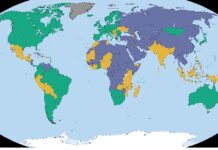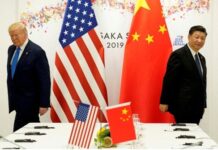Bangladesh,
of late, has emerged as a successful business model in the
subcontinent, given its adaptation to international market standards.
With growth in the exports and ever increasing employment sector,
both the public and private sector in Bangladesh have contributed
significantly in the last few years.
This has been
possible due to increased investments from both the government and
developing nations such as the US, Japan, South Korea. Bangladesh in
turn, offers these countries an opportunity to explore potential
resources along with young demographic dividend, which has the
capacity to shape the future developments.
One of the
attempts in this context came recently when Prime Minister Sheikh
Hasina visited New York along with her team that included the likes
of ICT Affairs Advisor Sajeeb Wazed Joy, Private Industry and
Investment Advisor Salman
F Rahman,
Foreign Minister AK Abdul Momen, among others.
Speaking at
a roundtable discussion organized by the US Chamber of Commerce in
New York, Prime Minister Sheikh Hasina said that such investment and
engagement are a “win-win option” for both the countries.
She further acknowledged the importance of the US as Bangladesh’s 2nd
largest trading partner and the largest investment partner. “As the
fourth Industrial Revolution is also knocking at our door, it is all
the more important that you stay with us in our journey for shared
benefit and prosperity,” she said.
It
is expected that Industrial Revolution 4.0 could be centered on
advanced technologies such as artificial intelligence, block chain,
virtual reality and internet of things. Thus, there has been a shift
in dynamics and industries altogether are being digitalized. Mode of
transactions have changed and the country is now moving towards
digital banking, biometrics, etc.
To this, Sheikh Hasina
said that Bangladesh has the “most liberal investment policy” in
South Asia and the country offers “tremendous potential for it
to be the economic hub of the region.
Besides this, the
country has also been quite transformative, given the significant
increase in the number of businessmen and entrepreneurs. To meet the
future objective and understanding the market demands, the government
has been pushing for skill development programs, as it can open more
doors for talented individuals and arrest the unemployment
rate.
Similar ideas were echoed by the Prime Minister’s
Private Industry and Investment Advisor Salman F Rahman at a meeting
in the capital, where he emphasized on the need for new and budding
entrepreneurs to upgrade their skill set to make Bangladesh progress
towards development. “The Chinese and Japanese are investing here.
So, knowing their languages can help you for the sake of your
business,” he said.
Meetings with foreign diplomats led
by dynamic Prime Minister Sheikh Hasina, Foreign Minister AK Abdul
Momen and Private Industry and Investment Advisor Salman F Rahman are
expected to bring more investments in the future. This can accelerate
the overall growth of the country, which is already growing at a
brisk pace.
Additionally, private players have emerged as
a catalyst of change, where new ideas are propping up from different
parts of the country. That said, there is a need for further
improvement. Bangladesh can adopt an experimental and innovative
outlook to build new potential based on advanced technologies and,
most importantly, shape the sectors, industries and national agenda
locally as well as globally.
























































